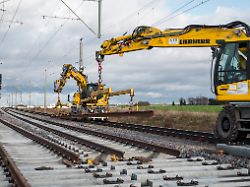New plan after Karlsruhe ruling
Railway renovation: where does the money come from?
December 14, 2023, 8:00 p.m
Listen to article
This audio version was artificially generated. More info | Send feedback
The federal government wants to extensively renovate the German rail network with 40 billion euros. But then the Federal Constitutional Court messes up the plans. The traffic light decides that rail spending should not be cut anyway – and is now presenting a new financing plan.
In November, passengers once again became painfully aware of the need for renovation of the German rail network. Almost every second Deutsche Bahn long-distance train was delayed last month – also because construction sites have been slowing down traffic for years. The federal government wants to change that and upgrade the rail network with almost 40 billion euros in the coming years.
But the Federal Constitutional Court threw these plans into disarray with its budget ruling. Suddenly at least 12.5 billion euros were in question for the modernization of the railway infrastructure – as a result of the ruling on the Climate and Transformation Fund (KTF). For weeks it remained unclear whether the government would stick with the planned investments and where the money would come from.
Financing through truck tolls and equity capital
It has been clear since Tuesday night: There will be no cuts in rail spending. The coalition said the investments would be financed in other ways. There are no savings measures at the railway. It was previously planned that the billions of euros for the so-called general renovation of important route corridors in the coming years would come from the federal government’s core budget – primarily from income from expanding the truck toll. It stays that way.
In addition, the federal government had already decided to increase equity capital of 12.5 billion euros for the federally owned Deutsche Bahn AG. A further 12.5 billion euros should come from the KTF. This has changed now. Instead of using the funds from the fund, the federal government is aiming for a further increase in equity so that the group can finance the investments itself, according to sources in the Ministry of Economic Affairs. This means that the “urgently necessary investment offensive” in the railways continues to be secured.
The federal government wants to sell shares in Post and Telekom
There is already an idea as to where the money should come from: “We will privatize federal investments that are no longer necessary and use the proceeds to strengthen Deutsche Bahn,” said finance ministry circles. The “Spiegel” reported that the government probably only wanted to hold a strategic stake of 25 percent plus one share in Telekom.
At the post office, however, the traffic light should plan to sell more shares. “It is good and right to put federal investments to the test,” said the FDP parliamentary group’s rail policy reporter, Valentin Abel, when asked. “Especially if it frees up funds for the urgently needed modernization of our infrastructure.”
Deutsche Bahn, in turn, is currently pushing ahead with the sale of the logistics subsidiary Schenker. She is currently looking for a buyer for the well-running group. However, the funds from the sale are actually intended primarily for reducing the railway’s billion-dollar mountain of debt. It is quite possible that a large part of the sales proceeds will now have to flow into the modernization of the rail network.
“The proceeds from the Schenker sale are very welcome for the renovation of the dilapidated rail infrastructure,” said Green transport politician Matthias Gastel. “The management of Deutsche Bahn should no longer have to spend a lot of time looking after a global logistics company, but should finally concentrate exclusively on reliable rail transport in Germany.”
Full closures from summer
40 highly stressed railway lines are to be completely closed for around five months each by 2030 and then completely renovated and upgraded. It starts next summer on the Riedbahn between Frankfurt and Mannheim, one of the busiest rail corridors in the republic. The following year the Hamburg-Berlin route was renovated. The railways and the federal government are convinced that the situation in rail traffic will gradually improve with each renovated corridor because the capacity of the overall network continues to increase.
However, the construction work initially entails further restrictions for passengers. In long-distance and freight transport, travel times have been significantly extended for months due to the full closures. In regional transport they have to switch to replacement buses. The planned costs for the Riedbahn renovation alone have recently increased and, according to the railway, amount to around 1.3 billion euros.
End of austerity is welcomed
The rail industry reacted happily to the federal government’s commitment not to cut rail investments. “This allows the railway companies and their customers to breathe a sigh of relief for the time being,” said Neele Wesseln, managing director of the “Die Güterbahnen” association. The association organizes competition from Deutsche Bahn in freight transport. “The traffic light correctly recognized that the decades-long austerity measures must not be continued.”
The pro-rail alliance Alliance also expressed its delight at the government coalition’s decision. Managing director Dirk Flege said it was a milestone that the government had agreed to reduce environmentally harmful subsidies in transport.
